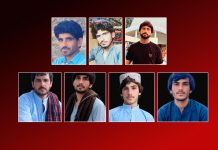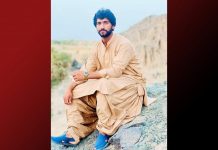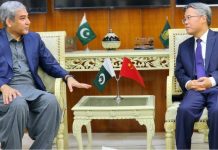By Dilshad Baluch
Introduction
Pakistan’s southwestern province Balochistan, a region torn apart by military bombardments, extrajudicial killings, forced disappearances, and mass displacements, has left people with no choice but to resist for their survival. Among the many voices resisting Pakistan’s oppression, one emerging figure is Dr. Shalee Baloch. As the central organizer of Baloch Women Forum (BWF), she is becoming a prominent voice, challenging Pakistan’s violent suppression of Balochistan.
While Dr. Mahrang Baloch, Dr. Sabiha Baloch, and Sammi Deen Baloch have gained recognition for their courageous leadership and struggle through the Baloch Yakjehti Committee (BYC), Dr. Shalee has concentrated on another key front—mobilizing masses, particularly women from conflict-ridden and remote areas like Awaran and Mand. Through the Baloch Women Forum (BWF), she is striving to bring more women into the struggle, ensuring that Baloch women, long suppressed by state violence, enforced modern feudal-tribal system, and imposed societal restrictions, reclaim their historical place in resistance.
Despite facing threats, harassment, and even criminal charges, Dr. Shalee remains undeterred. From her upbringing in Shapuk, Kech, amid state violence, to her fearless leadership in BWF, her journey embodies the courage and determination of Baloch women who refuse to be silent in the face of state violence.
This is the story of every Baloch mother, sister, and widow who is resisting Pakistan’s occupation of Balochistan, and is willing to sacrifice everything for the sake of an oppression-free future.
Childhood in a War Zone
Growing up in the village of Shapuk, Kech, Dr. Shalee Baloch completed her early education in Shapuk before matriculating from Kech Grammar School. She pursued her intermediate studies at Government Girls Degree College, Turbat, and later earned her MBBS from Bolan Medical College, Quetta.
“I was born in an era when state oppression and tyranny were at their height,” Dr. Shalee recalls. “I witnessed my people being subjected to brutality, and I grew up in the midst of war.”
Her childhood was not filled with playgrounds or fairy tales but with the brutal realities of war. She recalls villages being burned, homes raided at dawn, and men forcibly taken away, never to return. “Every night, I feared that by 4 a.m., our village would be encircled by the army because it happened almost daily. They stormed homes, beat and tortured women, and abducted men.” Bomb blasts and gunfire were the background noise of her school days. “Even in class, my mind was distracted by the deafening sounds of explosions.”
But rather than just fear, these experiences instilled in her a deep sense of purpose. She witnessed mutilated bodies, homes turned to ashes, and families destroyed, all for the crime of loving their homeland. “I deeply admired those who stood up for the cause, and those who resisted. I would sit in their discussions, and whenever there were protests or gatherings, I went along.”
Her mother played a key role in shaping her political consciousness, often taking her to protests and mass gatherings where she listened to unparalleled leaders like Banuk Karima Baloch, Saadat Marri, and Agha Abid Shah. “I don’t remember the exact year, but my mother once took me to a gathering in Heeronk, Kech, where Saadat Marri spoke. I also recited a poem there.” She also attended a gathering in Shahrak, Kech, where Banuk Karima Baloch addressed the crowd, and in a seminar at Park Hotel Turbat featuring both Banuk Karima and Agha Abid Shah.
She vividly remembers sneaking onto a bus to attend the 40th-day memorial of Baloch National Movement leader Chairman Ghulam Muhammad. “At the memorial, a boy was distributing keychains with Chairman Ghulam Muhammad’s picture on them. He gave me one, and I still have it to this day.
The Rise of a Political Activist
Her involvement in political activism formally began in 2011 when she joined the Baloch Students Organization Azad (BSO-Azad), a historic organization that has played a central role in shaping Baloch resistance. From making posters and writing slogans on walls to mobilizing people for rallies, she immersed herself in the movement.
“I still remember that once, after school dismissal when Qambar Chakar’s sister and I wrote slogans on the walls. The next morning, the principal called us to the office, saying they had recognized our handwriting and would expel us,” she recalls.
As she moved to Degree College, her activism grew stronger. “In 2013, a large rally was organized under Banuk Karima’s leadership. I was tasked with mobilizing people, so we visited every school and gathered participants,” she recalls.
This period also marked a turning point in Baloch politics. By 2014, the Pakistani state had escalated its crackdown on Baloch political activists, abducting and killing leadership figures and the masses alike. “That year, enforced disappearances were at their peak in our village, and my father was among those forcibly disappeared.” Though he was released a few months later, the trauma remained.
Despite the crackdown, she remained engaged in activism, and after Malik Naz’s killing by state-backed death squads in May 2020, she actively contributed to the Baloch Yakjehti Committee’s efforts in Quetta. Later, she joined the Baloch Students Action Committee (BSAC) and was appointed as the Secretary General of its Quetta Zone in 2021. After earning her Degree from Bolan Medical College and concluding her student political activities, she joined the Baloch Women Forum (BWF) in 2023 and was selected as its Central Organizer.
“My political journey was neither a sudden decision nor an emotional reaction. It was shaped by years of oppression, the struggle of my people and their undying love for Balochistan.”
The Birth of the Baloch Women Forum (BWF)
On International Women’s Day in 2020, the Baloch Women Forum (BWF) was formed. While it was not the first women-led organization in Balochistan, it became an essential part of the growing resistance movement in Balochistan. The organization carries forward the legacy of those who have been resisting state repression for decades.
Dr. Shalee says that the forum takes inspiration from women-led movements in Angola, Algeria, Vietnam, and Kurdistan. “If half of a nation’s population remains unconscious of its role in the struggle, that nation can never be free,” she emphasizes.
BWF is working to expand its reach, especially into the most militarized and remote parts of Balochistan, where state violence has made activism nearly impossible. “I know how difficult it is to work in those regions that the state has turned into war zones,” Dr. Shalee says. She describes the dire conditions, adding, “Many parts of Balochistan seem like people are stuck in the 19th century, deprived of even the most basic necessities.” Despite these hardships, BWF has managed to structure itself in several parts and has reached out to villages deeply affected by state violence.
BWF’s ideology is purely based on Baloch nationalism and strives to create a politically aware generation of Baloch women who can play an active role in the Baloch national struggle. It seeks to challenge both the state oppression and the modern feudal-tribal system and societal restrictions enforced on Baloch society.
“For decades, we have been living a life where one half is shaped by state oppression, and the other half is controlled by an enforced modern tribal and feudal system,” Dr. Shalee explains, “This system has stifled critical thinking, expression, and political consciousness, preventing the emergence of women.”
She adds, “Yet, despite constant state oppression and violence, Baloch women have emerged as symbols of resistance on the global stage.”
Gender and Resistance in Balochistan
Dr. Shalee rejects the idea that women experience a fundamentally different form of oppression from men under occupation. “For an oppressor, gender is irrelevant. What they target is your identity. The means of oppression might differ, but the objective remains the same.”
However, she acknowledges that the manipulated version of culture has added another layer to the struggle. “Our history is filled with women who waged and ended wars, yet today, the oppressor has distorted our culture to confine women behind veils and walls,” she explained, “The same people who say activism is ‘against our culture’ are themselves complicit in crimes against women.”
She insists that Baloch women are not separate from the national struggle but an essential part of it. “We are not asking for space; we are reclaiming what was always ours.”
Facing State Repression and Family Challenges
Dr. Shalee’s activism has come at a personal cost. The state has not only targeted her directly but has also weaponized her own family against her. “When they fail to silence you, they pressure your family, threaten your loved ones, and try to create emotional gaps.” She remembers how her family faced repeated harassment, pressure, and warnings to keep her away from activism.
“The biggest challenge I faced wasn’t just from the state but from within my own family,” she admits. “One part of our life is spent fighting state oppression, and the other part is struggling against the imposed tribal and patriarchal system that reinforces the state’s dominance.”
In Balochistan, enforced disappearances are a brutal reality, but when a woman is targeted, the consequences are even harsher, as imposed societal restrictions deepen their suffering and families are often pressured to disown politically active women, leaving many into silence. Those leading protests face arrests, intimidation, and media blackouts, while the state exploits societal pressure to suppress their activism.
But despite these hardships, the BWF continues to expand. The organization has conducted awareness programs in Balochistan’s most conflict-ridden parts, including Awaran, a district severely affected by military operations.
Awaran: Resistance in a War Zone
The Baloch resistance has been deeply rooted in villages like Mand, Tump, and Awaran, regions that have endured the worst of state repression yet remain central to the national struggle. These villages have produced some of the most committed individuals, making immense sacrifices for the movement. However, after the state’s escalated crackdown on Baloch politics during 2014, these areas turned into war zones. The crackdown created a gap that the state exploited, using every possible tactic to distract people from the national struggle. When political activities resumed around 2018, they became more concentrated in urban areas, leaving these rural regions largely neglected due to extreme security risks. For activists, entering these areas meant risking abduction, torture, or even death.
“As political workers, we should not wait for ‘normal’ circumstances before taking action,” she said, “The conditions are never ideal for a political worker; we must be ready for every situation.”
Awaran, like many regions of Balochistan, has suffered the worst kind of state violence. Thousands abducted and killed, families displaced, and entire villages turned into war zones. Yet, Dr. Shalee describes the people of Awaran as among the most politically conscious. “In Awaran, one can find characters, especially women, who remind us of the great revolutionaries from history. They possess a courage far greater than those recorded in books, but no one has written about them.” She added that they are willing to sacrifice everything for their homeland without any hesitation.
“When we decided to conduct programs in Awaran, I assumed people might be too afraid to attend after enduring so much brutality. But I was wrong. People participated in great numbers.” She explained that in these areas, political activism is not about basic amenities like water, roads, or hospitals, it is about survival as a people.
However, activism in Awaran comes with extreme risk due to state violence. The military’s grip on these villages is suffocating. “Even providing shelter to a political worker for a day can get you summoned to a military camp. Those who offer transportation face constant harassment and threats.” She also pointed out that while fear of state retaliation is widespread in Awaran, but women have shown remarkable courage, standing with activists despite the risks. “Men in these areas seem to be more fearful of the state than women; even something as small as greeting us in public could lead to threats.”
She also recalled how their presence in Awaran triggered further state surveillance and repression. “During our time in Awaran, state agencies kept us under constant watch. Everywhere we went, the families who hosted us were later summoned and threatened. At each program, attendees were interrogated about my colleagues, beaten, and tortured.”
Despite this intense repression, the people of Awaran stood by them. As she said, “They showed us the same love and respect they once gave to Banuk Karima Baloch. At times, I felt exhausted, but their support and smiles gave me strength.”
Criminalizing The Resistance
BWF under Dr. Shalee’s leadership, has actively conducted programs to honor Banuk Karima Baloch, the former chairperson of the Baloch Students Organization–Azad (BSO–Azad). BWF held seminars and gatherings in remote and highly militarized areas of Awaran to commemorate Banuk Karima’s sacrifices. In response to one such seminar in Tirtaj, Awaran, police registered an FIR against Dr. Shalee Baloch, Zakia Baloch, Arz Malik Baloch, and other members of BWF, accusing them of delivering “anti-state speeches” aimed at influencing children’s minds with hatred against the state.
In response, Dr. Shalee dismissed the allegations, calling them a desperate attempt to silence Baloch voices. “If honoring national heroes like Banuk Karima Baloch is a crime, then we will continue to commit this crime.” Rejecting intimidation tactics, she emphasized that the Baloch had already endured immense sacrifices and would not be deterred by false allegations. Instead of resorting to repression, she urged the state to reconsider its policies, warning that such tactics would never weaken their struggle.
“It’s the Doctor!”
“When I returned to Awaran for the second time, children saw me from a distance and started shouting, ‘It’s the doctor! It’s the doctor!’, she said, “That moment erased all my exhaustion, all my sleepless nights, and even the state’s threats.”
She says her time in Awaran was undoubtedly difficult, but it was also the most beautiful experience of her life. “Without struggle, a journey has no meaning. Hardships must be faced and overcome along the way.”
Mand: The Stories No One Writes
“After state’s crackdown on Baloch politics, I wanted to visit these areas myself. We hear about them, but experiencing them ourselves provides a completely different perspective. The political vacuum left after the crackdown has led to a stark contrast between how these villages used to be and what they have become.”
Her journey through Awaran had already exposed her to the extent of state oppression, but Mand revealed another layer of suffering. In both regions, there was a systematic strategy of control, which depended not only on brute force but also on economic deprivation, psychological warfare and social manipulation.
The state has turned survival itself a struggle, forcing many into economic despair, driving many into drug addiction, and ensuring that they are too occupied with day-to-day survival to think about the national struggle. “Visiting these villages, I saw how the state has deliberately marginalized people. Even the families of martyrs, who have given everything to the Baloch cause, are targeted,” she said, “Their children are forced to participate in staged photographs with Pakistani flags, all in an effort to erase their connection to their fallen loved ones.”
One of Dr. Shelee’s most unsettling experiences was her visit to Mand Maheer, where the military had forcibly occupied Baloch homes, evicting families and turning them into military outposts. It was a scene she had seen in the Awaran as well—entire communities displaced, their homes turned into outposts for the forces. “I met people resisting this occupation, and what impressed me the most was their unwavering determination. They were ready to make any sacrifice but they needed leadership, someone to stand with them against this tyranny.”
Despite constant surveillance, she remained determined to reach these villages. “Whether in an urban center or a remote village, we are always being monitored. I know the state will eventually send my body home one day, but we are mentally prepared for that.”
Yet, what she witnessed in Mand left her deeply shaken, just as Awaran had. “I have seen state violence from childhood, but visiting these villages made me understand the full extent of the suffering. I spoke to mothers who had lost their entire families, whose houses had been burnt down. The grief was overwhelming.” She mentioned, “At night, I couldn’t sleep so I wrote down their stories in notes on my phone.”
Wherever she went, whether to Mand, Tump, or Awaran, she saw widows, orphans, and villages silenced by state oppression. A mother in Mand told her:
“Every day, our home was raided by the occupying army. Every day, women were beaten and tortured. Eight members of my family were killed. Now, there is no one left to even bring us food.”
The family, desperate to save their other children from the escalating state operation, sent them away to seek safety. But their fate was merciless. “On their way, they met with an accident and didn’t survive.” Dr. Shalee paused, her voice heavy with grief, struggling to find the words. “What do you say to a mother who has lost everything?”
Another woman, her voice heavy with sorrow for her recently martyred husband, cried out:
“Oh, Balochistan, How many more lives must be sacrificed before the occupation ends?”
There are countless such stories in Balochistan. Families who have lost ten, fifteen, or even more loved ones in the struggle, yet their determination is unshaken. As Dr. Shalee added, “I met families who had sacrificed everything, yet there were no tears in their eyes.” She said, “They were determined to carry forward the legacy of their martyrs.”
During her time at Mand, women came to her—not only to share their stories, but also to seek medical help. “One woman told me she can’t sleep at night, haunted by nightmares of security forces raiding her village, abducting and torturing people,” she added, “But what medicine could heal that? Even if I had prescribed her an antidepressant, it would not have changed the daily reality of violence she faces.”
The psychological scars in these villages are immense, yet remain undocumented. “There are severe mental health issues due to state violence, but there is no research or documentation on them,” She said.
She also pointed out that if the world acknowledges the stories of women in other revolutionary movements, then the stories of Baloch women, such as those from Mand, must also be told.
“Anyone who wants to understand Balochistan, the oppression its people face, and the sacrifices they have made should visit these regions and experience their reality firsthand.”
Psychological and Social Impact of Activism
In a region where speaking the truth can lead to disappearance or death, activism is a constant psychological battle. For Baloch women, the risks are even greater, as they not only stand against state oppression but also challenge the fears within their own families and communities.
“Activism in our region brings immense pressure because of a fear narrative,” Dr. Shalee explains. “Families worry about the consequences, but what we try to do is convince them that the repression we face is not because of our activism, it is because the forces at the other end have already decided to carry it out.”
Despite the suffocating fear, Baloch women refuse to back down. Dr. Shalee and her colleagues at the Baloch Women’s Forum (BWF) draw strength from the sacrifices of those who came before them. “The Baloch movement is not spontaneous, it has taken decades of struggle and sacrifices. That history, that legacy, is our source of strength.”
She remains resolute, not as an isolated activist but as part of a larger struggle. “We derive everything from our people,” she says, reaffirming her commitment to the cause.
Baloch Women’s Struggle: Beyond Misrepresentation
For decades, Baloch women’s contributions to the struggle have been overlooked, dismissed or forgotten. Today, that is changing, with more women emerging as leaders. However, Dr. Shalee argues that this is not a new shift but a return to Balochistan’s true identity. “With time, things change, and the movement has been a driving force behind this shift. Yes, challenges remain, but we cannot deny the change in mindset.”
Unlike global feminist movements, the Baloch Women’s Forum (BWF) does not rely on external ideological frameworks. “Our ideology is deeply rooted within the Baloch society and Balochism,” Dr. Shalee explains. “We believe that you are undefeated only when you are connected to your roots. We are just trying to become strong branches of the same roots.” She emphasizes that this is not about demanding gender equality in isolation but about reclaiming Balochistan’s historical resistance before colonial and state intervention.
This national focus is often misunderstood. International observers sometimes frame Baloch women’s activism solely as a gender rights issue, missing the deeper political context. “Whether men or women, the struggle in Balochistan is purely for the Baloch national cause,” she clarifies.
The state does not target Baloch women because they demand equality. It targets them because they are part of a movement that threatens its occupation.
Global Neglect
Despite Baloch women’s increasing role in the resistance, their voices remain largely ignored in global discourse. The repression in Balochistan rarely makes international headlines, and when it does, it is often misrepresented. “They usually misinterpret our struggle by labeling women-led movements as issues of feminism,” Dr. Shalee states. This reductionist framing strips away the political nature of their activism, failing to recognize it as a fight against occupation.
Dr. Shalee urges the international community to engage with the Baloch cause beyond surface-level narratives. “We have continuously urged them to listen to our collective national grievances. They can support us by raising the Baloch issue within their groups and stakeholders, while the international media must connect with us to give coverage to the Baloch cause.”
She calls on the world to take immediate notice of the egregious human rights violations and genocide unfolding in Balochistan. “The Pakistani state’s systematic campaign of terror, enforced disappearances, extrajudicial killings, and cultural erasure demands your attention and action.”
A Struggle That Can Not Be Silenced
“I know the path I have chosen is difficult and filled with sacrifices. Life is given only once, and I have chosen to dedicate mine to this struggle. The love and support of my people keep me strong, and their unwavering belief in me gives me the strength to continue.”
If Pakistan believes that silencing Baloch people will weaken the struggle, it has miscalculated. With every attempt to suppress them, a stronger, more determined generation emerges. The stories of Awaran, Mand, and overall Balochistan—where war has shattered families but failed to break spirits, stand as a proof that Baloch women will not retreat. Their struggle isn’t only for their own survival but for an oppression-free future of their people.
Pakistan’s repression may be relentless, but so is the will to resist. And women like Dr. Shalee Baloch are ensuring that resistance grows stronger.
Disclaimer: The views and opinions expressed in this article are those of the author and do not necessarily reflect the official policy or position of The Balochistan Post or any of its editors.






























